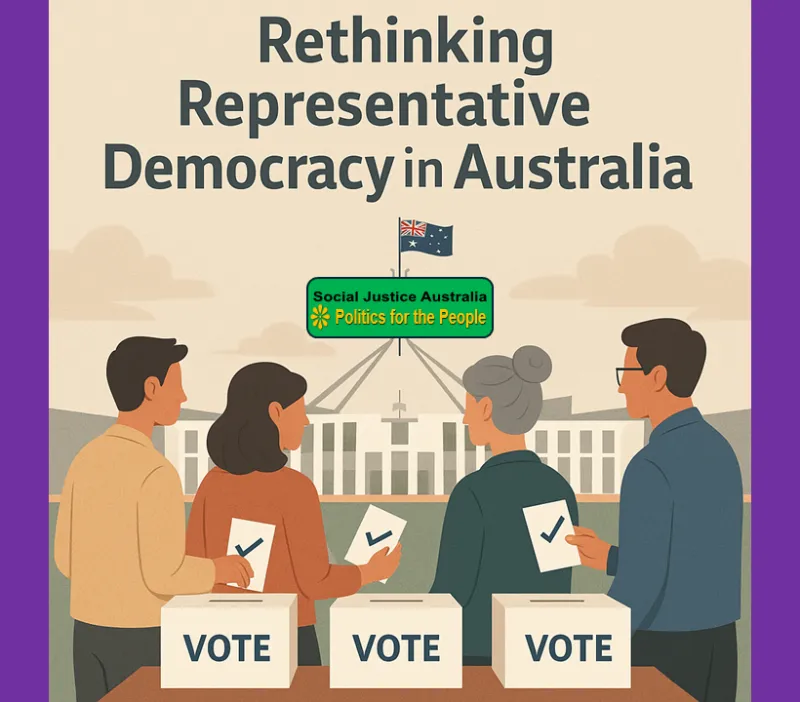Description
Australia’s representative democracy gives voters little power after elections. Is it time to rethink our system for the good of all citizens?
Introduction: The Ballot Box Illusion
Location: Suburban Brisbane, 2022 federal election.
Peter, a 67-year-old retiree, waited in line to cast his vote. He felt the same dull hope he had felt every election: that, somehow, his vote would matter this time. He marked his ballot, walked into the Queensland sun, and sighed. “Let’s see if they listen this time,” he muttered.
For millions like Peter, voting feels like a sacred act. But few realise that under representative democracy, their influence ends when their ballot slips into the box.
The Problem: Representation Without Power
What Representative Democracy Really Means
In theory, Australian democracy is built on representation. Citizens elect members of parliament to voice their concerns and vote on legislation. But here’s the catch: those representatives are not legally obliged to vote according to their constituents’ wishes.
Instead, they vote along party lines, enforced by “party whips” who ensure conformity. Many MPs’ real allegiance lies with the party leadership, not the public. In fact, dissenting MPs risk losing preselection, political favour, or even their careers.
The False Comfort of Safe Seats
Dominant parties rarely face serious competition in strongholds like Sydney’s North Shore or Melbourne’s west. Voters in these “safe seats” often find their voices drowned out, no matter who they vote for. It fosters apathy, knowing your vote barely dents the status quo.
Public Disillusionment
In a 2021 survey by the Museum of Australian Democracy, only 41% of Australians believed the government could be trusted to do the right thing. That’s a steep fall from 86% in 2007. When citizens feel unheard, representative democracy begins to unravel.
The Real-World Impact of Voter Disempowerment
Internal Dialogue of a Disillusioned Voter
“Why did I even bother voting?” Sarah, a single mother from Geelong, whispers while watching a news report about new housing policies favouring developers.
She had spent weeks researching her local MP, sent emails, and even joined a community group. But her representative voted with the party to fast-track rezoning laws that would drive up rents.
The policies don’t reflect the electorate’s needs. They reflect party deals, donor influence, and political ambitions.
Disconnect Between Public Will and Political Action
• 80% of Australians support more decisive climate action (Lowy Institute 2023), yet Australia remains one of the world’s top coal exporters.
• Most voters support integrity commissions, but major parties delayed reforms for years.
• Aged care crises, TAFE underfunding, and welfare shortfalls persist despite public support for reform.
This systemic disconnect proves that voter power is mainly symbolic in our current model of representative democracy.
Building a Better Democracy
Participatory and Digital Democracy

What if voters could shape policy between elections? In Switzerland, citizens can initiate national referenda. In Iceland, crowdsourced constitutions were attempted.
Closer to home, citizens’ juries and deliberative panels in South Australia have shown how public input can shape outcomes on issues like nuclear waste and transport.
Platforms like VoteWrap propose a revolutionary idea: let citizens vote on actual bills and policies, then direct their MPs accordingly. Digital platforms allow real-time feedback loops, reducing the gap between public will and parliamentary action.
Note: VoteWrap is a program/app being developed that returns power to the people. Australians can vote on every Bill, propose reforms, and shape laws, true public sovereignty in action to replace representative democracy.
Harnessing Australia’s Dollar Sovereignty for Reform
Australia’s monetary sovereignty means it can fund democratic innovations without “needing to raise taxes” or cut spending elsewhere. The fundamental constraint is political will, not financial capacity.
Investing in civic tech, public media, and voter education is not a luxury; it’s a democratic necessity.
The Role of Social Justice-Minded Independents and Small Parties
One of the most promising routes to reforming representative democracy lies with social justice-minded independents and minor parties. Rigid party lines or corporate donors do not bind these candidates. Instead, they often commit to community consultation, transparency, and public interest policies.
Examples include:
• The Teal Independents disrupted safe seats by listening to constituents and focusing on climate and integrity.
• Grassroots minor parties like The Greens or Indigenous-led movements that advocate for participatory reforms.
By supporting these candidates, voters can reassert control within the current system while pushing toward a more direct, responsive democratic model.
Why Reform Can’t Wait
Australia’s representative democracy has become a tool of elite power consolidation rather than collective will. Once a model admired globally, it now leaves many citizens feeling powerless.
But we have options. Participatory tools, digital platforms, and citizen assemblies are not utopian dreams; they’re happening worldwide. And with public money created by our sovereign currency-issuing government, Australia has the means to act.
By electing social justice independents and reformist parties, we can begin to repair democracy from within and lay the foundation for more participatory governance.
Q&A Section
Q1: Why doesn’t my MP follow the will of the people?
Because of party loyalty, enforced by internal mechanisms like the party whip. MPs who defy leadership often face severe repercussions.
Q2: Can we implement referenda in Australia like in Switzerland?
Yes. Australia could introduce national referenda or citizens’ initiatives if enough political will and legislative support existed.
Q3: Is there a cost to participatory or digital democracy?
Yes, but Australia’s monetary sovereignty means we can afford to fund democratic tools. The real cost is not acting and continuing voter disengagement.
Question for Readers
Do you believe your vote truly shapes Australia’s future, or are we trapped in a system that listens only every few years?
Call to Action
If you found this article insightful, explore more on political reform and Australia’s monetary sovereignty at Social Justice Australia: https://socialjusticeaustralia.com.au/
Share this article with your community to help drive the conversation toward a more just and equal society.
Click on our “Reader Feedback” page. Please let us know how our content has inspired you. Submit your testimonial and help shape the conversation today!
Curious what others think? Please read what our readers are saying on our Reader Testimonials page
Additionally, leave a comment about this article below.
Support Social Justice Australia – Help Keep This Platform Running
Social Justice Australia is committed to delivering independent, in-depth analysis of critical issues affecting Australians. Unlike corporate-backed media, we rely on our readers to sustain this platform.
If you find value in our content, consider making a small donation to help cover the costs of hosting, maintenance, and continued research. No matter how small, every contribution makes a real difference in keeping this site accessible and ad-free.
💡 Your support helps:
✅ Keep this website running without corporate influence
✅ Fund research and publishing of articles that challenge the status quo
✅ Expand awareness of policies that affect everyday Australians
💰 A one-time or monthly donation ensures Social Justice Australia stays a strong, independent voice.
🔗 Donate Now
Thank you for being part of this movement for truth and justice.
Reference:
Australian Parliament Explained: Democracy

